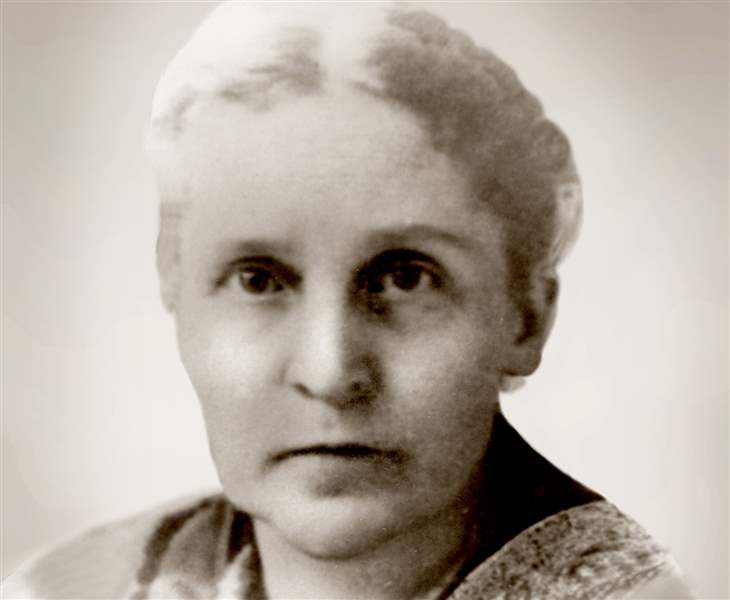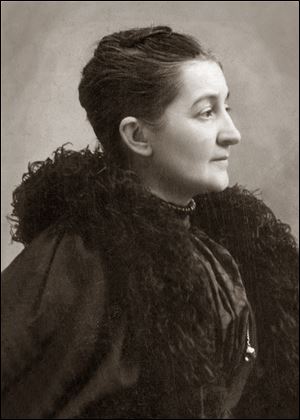
Pioneering female lawyers from Tiffin to be recognized
Marker to note sisters were first women admitted to Ohio bar
10/21/2013
An annual award from the Ohio Bar Association is named after Nettie Cronise Lutes.

An annual award from the Ohio Bar Association is named after Nettie Cronise Lutes.
TIFFIN — Two women who blazed a trail for women “in a man’s world and in a man’s work” will be memorialized in the city where they became Ohio’s first female lawyers.
In 1873 — nearly 50 years before women received the right to vote — Nettie Cronise Lutes and her sister Florence Cronise became the first two women admitted to the Ohio bar. A historical marker to tell this little-known piece of history is to be installed Wednesday on the lawn of the former 1884 Seneca County Courthouse in downtown Tiffin with Ohio Supreme Court Chief Justice Maureen O’Connor on hand for the dedication. Court Street also will receive the honorary designation, N. & F. Cronise Way.
Hilary Damaser, an assistant Ohio attorney general who has researched the women, said the tribute is long overdue.
“They are fascinating because they were among the first women to actually practice law,” Ms. Damaser said, explaining that while more women first became lawyers in the Western states, “The ones in the West who were licensed before them were more like paralegals. They became lawyers to help their husbands. Nettie and Florence became lawyers to litigate.”
Raised by their grandparents after their own parents divorced, Nettie and Florence both attended Heidelberg College, although only Florence graduated. Both were teachers before studying the law for two years, gaining admission to the bar, and opening their own firm.
“They were strong people who knew what they wanted and knew what they deserved and they went out and got it,” said Jim Fruth, president of the Seneca County Bar Association. “They wanted to be lawyers and they pursued it doggedly and secured it. It’s amazing that it happened in a town like ours.”

Florence Cronise wrote she and her sister battled a lack of confidence in the ability of women.
Mr. Fruth spearheaded the effort to secure an historical marker after learning that many of his fellow lawyers were as ignorant as he was of their contribution.
“I was out casually having a conversation with an attorney a generation older than me who was a lifelong resident of Seneca County, and I mentioned them and that attorney admitted never having heard of them,” Mr. Fruth recalled. “That frightened me. I thought, if we don’t do something to recognize these two women, it’s going to be lost to history.”
He floated the idea of applying for a historical marker from the Ohio Historical Society, and the local bar association was able to secure a grant from the historical society as well as donations from the state bar association and the Barnes-Deinzer Seneca County Museum Foundation to help pay for it.
County commissioners agreed to allow the marker to be installed on the lawn where the 1884 courthouse once stood. The courthouse was demolished by commissioners last year despite efforts by historic preservationists to renovate it.
Mr. Fruth said the marker’s location at the corner of Washington and Court streets is in close proximity to the sisters’ former law offices.
“After all the controversy over the courthouse, it’s kind of interesting to note that these two sisters got their license even before this courthouse was built, so they would have been among the first people to practice in our historic courthouse,” Mr. Fruth said.
Fellow bar member Victor Perez said the Cronise sisters were impressive in their determination to practice law.
“It appears clear that they knew that what they were doing was difficult, but they didn’t let that stop them,” he said.
Their own writings indicate they didn’t see themselves as trailblazers, much less feminists. Florence said they turned down speaking engagements to focus on their law practice — a general practice that initially did not attract many female clients, she said, because they had “but little confidence in the ability of women.”
“Our brothers extended the hand in welcome, so far as to put no visible obstacle in our way — neither did they make any effort to remove any,” Florence wrote in an 1888 letter to the Equity Club — an organization of female lawyers from across the country. “We began on the same footing as any of the young men, and have kept on to the present.”
U.S. Magistrate Judge Vernelis Armstrong said she was humbled to receive the Nettie Cronise Lutes Award from the Ohio State Bar Association in 2006 — an award given to female lawyers who have “improved the legal profession through their own high level of professionalism and have opened doors for other women and girls.”
“Just to survive during that period of time would have required amazing stamina, so to also take on a profession where there were no women would be a daunting challenge,” Judge Armstrong said. “I have great admiration for them.”
An editorial published in the former Toledo News-Bee upon Nettie’s death in 1923 advocated for a memorial such as the one that will be unveiled Wednesday.
“Fifty years ago woman’s place was surely in the home, in the belief of almost everyone. Today many cling to this idea, but in those days agreement was practically unanimous,” the newspaper wrote. “Yet this brave woman, then in her mental and physical prime at the age of 30, faced prejudice fearlessly and carved out a place for herself in a man’s world and in a man’s work.
“Since that time many other women have followed in her footsteps but their way has been made easier by the trail she blazed alone. We cannot resist the sentiment that the women of Ohio owe this pioneer sister of theirs a debt that should be paid in some form of memorial.”
Contact Jennifer Feehan at jfeehan@theblade.com or 419-213-2134.